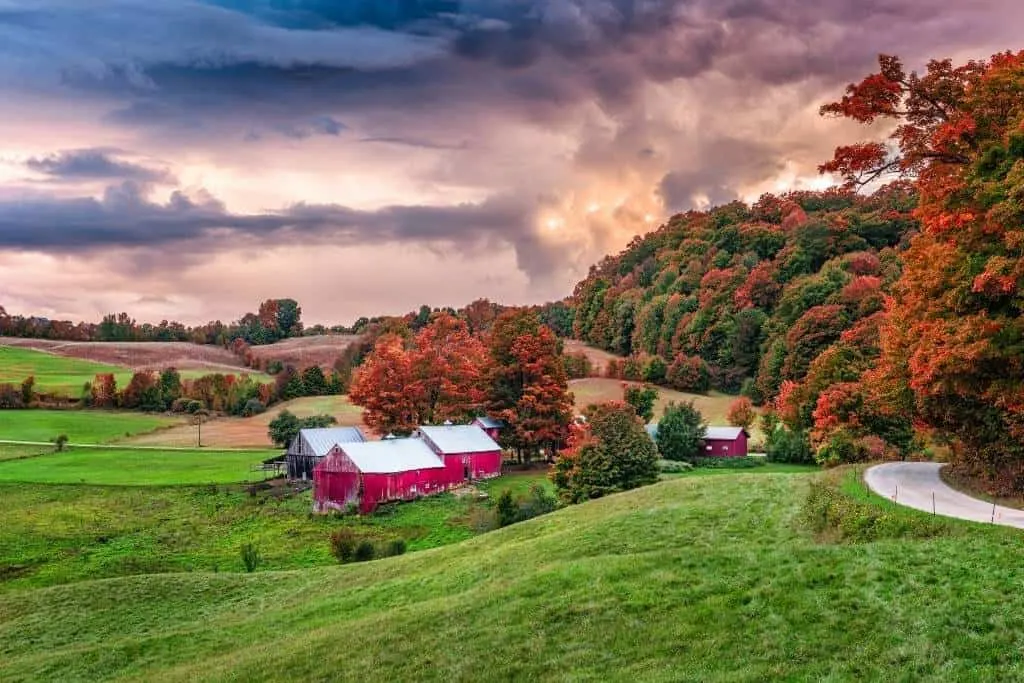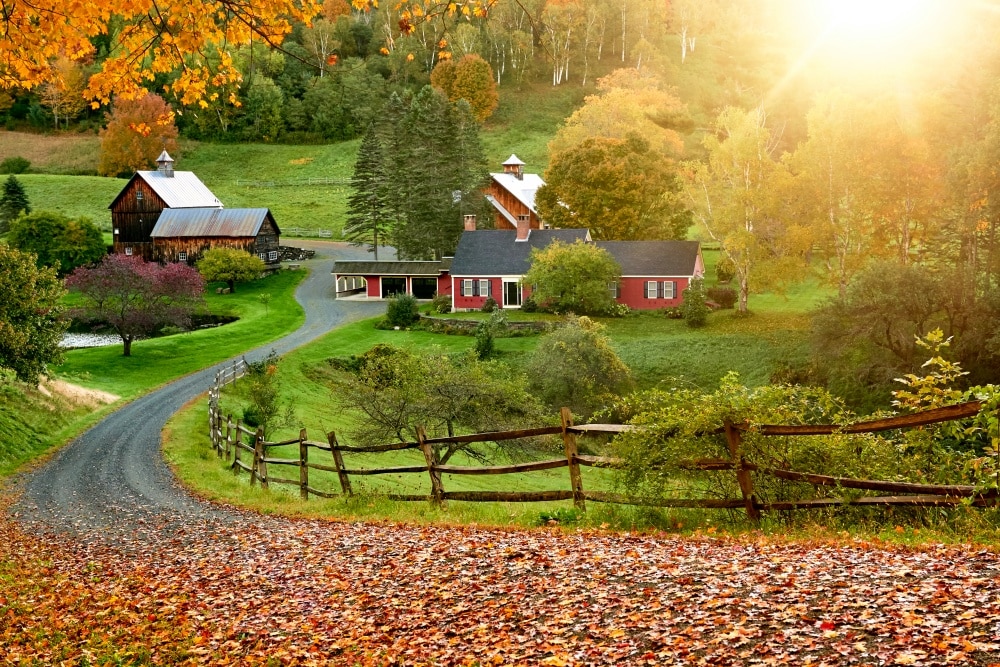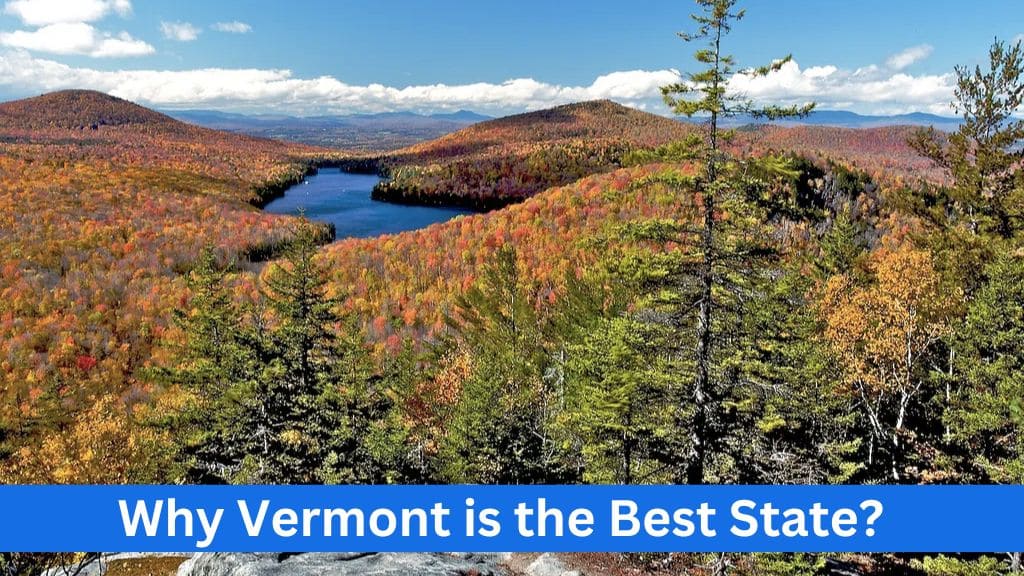Vermont, nestled in the northeastern part of the United States, often evokes images of quaint towns, rolling green hills, and vibrant autumn foliage. But beyond its picturesque landscapes, Vermont offers a unique charm and lifestyle that sets it apart from other states. In this blog post, we’ll explore why Vermont stands out as the best state, covering everything from its natural beauty to its thriving communities and cultural offerings.
Natural Beauty

1. Scenic Landscapes
Vermont’s landscape is characterized by its rolling green hills, lush forests, and majestic mountains. The crown jewel of Vermont’s natural scenery is undoubtedly the Green Mountains, which run north-south through the state, offering breathtaking views and endless opportunities for outdoor adventure. From the rugged peaks of Mount Mansfield, the state’s highest point, to the gentle slopes of Camel’s Hump and Mount Abraham, the Green Mountains provide a playground for hikers, skiers, and nature enthusiasts alike.
In addition to the mountains, Vermont is blessed with an abundance of pristine lakes, rivers, and waterfalls. Lake Champlain, one of the largest freshwater lakes in the United States, stretches along Vermont’s western border, offering opportunities for boating, fishing, and lakeside relaxation. Smaller bodies of water, such as Lake Willoughby and Lake Bomoseen, dot the landscape, providing scenic spots for swimming and picnicking.
2. Seasonal Delights
Each season in Vermont brings its own unique charm and beauty. In the fall, Vermont transforms into a kaleidoscope of color as the leaves change from green to vibrant shades of red, orange, and yellow. Leaf-peeping season draws visitors from around the world to witness the spectacular foliage, whether driving along scenic byways like Route 100 or hiking through the state parks.
Winter in Vermont is synonymous with snow-covered landscapes and outdoor adventure. The state boasts world-class skiing and snowboarding destinations, including Stowe Mountain Resort, Killington Ski Resort, and Sugarbush Resort. Cross-country skiing, snowshoeing, and ice fishing are also popular winter activities, offering opportunities to explore Vermont’s winter wonderland.
Spring brings a burst of life to Vermont as wildflowers bloom, rivers swell with snowmelt, and trees begin to bud. Hiking trails come alive with color, and waterfalls cascade down mountainsides, creating picturesque scenes around every corner. As temperatures warm, Vermonters emerge from hibernation to enjoy outdoor activities like biking, birdwatching, and maple sugaring.
Summer in Vermont is a time of lush greenery, warm sunshine, and outdoor festivals. Visitors can explore hiking trails, swim in pristine lakes, and attend community events like farmers markets and outdoor concerts. Vermont’s numerous state parks offer opportunities for camping, picnicking, and wildlife viewing, allowing visitors to immerse themselves in the state’s natural beauty.
Strong Sense of Community

1. Small-Town Charm
One of the hallmarks of Vermont’s sense of community is its small-town charm. Whether you’re in the bustling city of Burlington or a quaint village nestled in the countryside, you’ll find a tight-knit community where neighbors know each other by name and look out for one another. Small-town gatherings, such as town meetings, farmers markets, and community events, provide opportunities for residents to come together, share stories, and strengthen bonds.
2. Supportive Communities
Vermonters take pride in supporting local businesses, artisans, and farmers, fostering a sense of community and sustainability. From farm-to-table restaurants serving locally-sourced ingredients to craft breweries producing unique, small-batch beers, Vermont’s economy is rooted in supporting local enterprises. Farmers markets, co-ops, and roadside stands abound, offering fresh produce, handmade crafts, and artisanal goods, further strengthening the connection between producers and consumers.
3. Volunteerism and Civic Engagement
Vermonters are known for their spirit of volunteerism and civic engagement, actively participating in community initiatives, nonprofit organizations, and local government. Whether it’s organizing a neighborhood cleanup, volunteering at a food pantry, or serving on a town board, residents are deeply invested in making their communities better places to live. This culture of giving back fosters a sense of pride and belonging, as individuals come together to address common challenges and celebrate shared successes.
4. Resilience and Adaptability
Vermont’s sense of community is further evidenced by its resilience and adaptability in the face of adversity. Whether it’s weathering harsh winters, recovering from natural disasters like Tropical Storm Irene, or navigating economic challenges, Vermonters come together to support one another and rebuild stronger communities. The spirit of resilience and solidarity that emerges during times of hardship strengthens the bonds of community and fosters a sense of belonging among residents.
5. Inclusive and Welcoming Atmosphere
Vermont prides itself on being an inclusive and welcoming place for people of all backgrounds and identities. Whether you’re a longtime resident or a newcomer, Vermont embraces diversity and celebrates the unique contributions of each individual. Community organizations and advocacy groups work tirelessly to promote equity, diversity, and inclusion, ensuring that everyone feels valued and respected within the community.
Progressive Values

1. Trailblazing Policies
Vermont has a history of pioneering progressive policies that have set precedents for the rest of the country. For example, Vermont was the first state to abolish slavery in its constitution in 1777, decades before the Civil War. In 2000, Vermont became the first state to legalize civil unions for same-sex couples, paving the way for marriage equality nationwide. More recently, Vermont has been a leader in areas such as healthcare access, renewable energy, and criminal justice reform, demonstrating a commitment to progressive values and social justice.
2. Environmental Stewardship
Vermont has a deep appreciation for its natural environment and a strong commitment to environmental stewardship. The state prioritizes sustainability initiatives, such as renewable energy development, land conservation efforts, and organic farming practices. Vermont is a national leader in renewable energy, with a goal of reaching 90% renewable energy by 2050. The state has also implemented programs to reduce greenhouse gas emissions, protect natural habitats, and promote outdoor recreation and conservation.
3. Social Justice and Equity
Vermont is committed to promoting social justice and equity for all its residents. The state has enacted laws and policies aimed at addressing systemic inequalities and promoting inclusivity. Vermont has made strides in areas such as affordable housing, healthcare access, education, and criminal justice reform, working to ensure that all residents have equal opportunities and access to resources. Community organizations and advocacy groups play a vital role in advancing social justice initiatives and amplifying the voices of marginalized communities.
4. Healthcare Access
Vermont has been a trailblazer in healthcare reform, with a commitment to ensuring access to affordable, quality healthcare for all residents. In 2011, Vermont passed legislation to establish a publicly funded healthcare system known as Green Mountain Care, with the goal of providing universal healthcare coverage to all Vermonters. While the implementation of Green Mountain Care has faced challenges, Vermont continues to explore innovative solutions to improve healthcare access and affordability for its residents.
5. LGBTQ+ Rights
Vermont has a long history of LGBTQ+ rights activism and advocacy, dating back to the 1970s. In 2000, Vermont became the first state to legalize civil unions for same-sex couples, granting them many of the same rights and benefits as married couples. This landmark legislation paved the way for marriage equality nationwide, with Vermont eventually legalizing same-sex marriage in 2009. Vermont continues to be a leader in LGBTQ+ rights, with strong legal protections against discrimination based on sexual orientation and gender identity.
Cultural Richness

1. Arts and Culture Scene
Vermont boasts a thriving arts and culture scene, fueled by a community of artists, musicians, writers, and performers. From world-class museums and galleries to intimate theaters and music venues, Vermont offers a wealth of cultural experiences for residents and visitors alike. Burlington, the state’s largest city, is home to institutions such as the Fleming Museum of Art, the Flynn Center for the Performing Arts, and the Burlington City Arts Center, showcasing a diverse array of visual and performing arts. Throughout the state, you’ll find art galleries, studios, and craft fairs celebrating local artisans and their creations.
2. Historical Heritage
Vermont’s rich history is preserved in its historic sites, museums, and landmarks, offering glimpses into the past and the people who shaped the state’s identity. Visitors can explore sites such as the Shelburne Museum, a sprawling complex featuring historic buildings, folk art, and Americana, or Hildene, the former summer home of President Abraham Lincoln’s son. Vermont’s colonial heritage is celebrated in towns like Bennington and Montpelier, where historic districts and landmarks reflect the state’s early settlers and revolutionary history.
3. Literary Legacy
Vermont has a strong literary tradition, with a legacy of writers and poets who have drawn inspiration from the state’s natural beauty and rugged landscapes. Notable literary figures associated with Vermont include Rudyard Kipling, who wrote “The Jungle Book” while living in Dummerston, and Robert Frost, who penned some of his most famous poems during his time in the state. Today, Vermont continues to attract writers and literary enthusiasts, with events like the Vermont College of Fine Arts’ Writing Seminars and the Brattleboro Literary Festival celebrating the written word and fostering literary community.
4. Festivals and Events
Vermont’s cultural calendar is filled with festivals and events celebrating everything from music and art to food and heritage. Whether it’s the Burlington Discover Jazz Festival, the Vermont Quilt Festival, or the Vermont Maple Festival, there’s always something happening year-round to entertain and inspire. Community events like farmers markets, craft fairs, and town parades provide opportunities for residents to come together, share traditions, and celebrate local culture.
5. Culinary Delights
Vermont’s culinary scene is a reflection of its agricultural heritage and commitment to locally-sourced, farm-to-table cuisine. From artisanal cheeses and craft beers to maple syrup and farm-fresh produce, Vermont’s food offerings are as diverse as its landscapes. Visitors can explore farmers markets, food festivals, and farm-to-table restaurants, savoring the flavors of Vermont’s rich culinary heritage.
Conclusion
Vermont’s appeal lies not only in its stunning natural beauty but also in its strong sense of community, progressive values, and cultural richness. Whether you’re drawn to its scenic landscapes, vibrant arts scene, or commitment to sustainability, Vermont offers a truly unparalleled experience. So why is Vermont the best state? Because it embodies the very essence of what it means to live a fulfilling and authentic life, surrounded by beauty, community, and opportunity.

